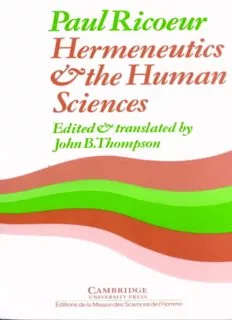
Hermeneutics and the Human Sciences: Essays on Language, Action and Interpretation PDF
Preview Hermeneutics and the Human Sciences: Essays on Language, Action and Interpretation
Hermeneutics and the Human Sciences Hermeneutics and the Human Sciences Essays on Language, Action and Interpretation B Paul Ricoeur Edited,translated andintroduced by . JOHN B THOMPSON UniversityPrintingHouse,CambridgeCB28BS,UnitedKingdom CambridgeUniversityPressispartoftheUniversityofCambridge. ItfurtherstheUniversity’smissionbydisseminatingknowledgeinthepursuitof education,learningandresearchatthehighestinternationallevelsofexcellence. www.cambridge.org Informationonthistitle:www.cambridge.org/9781316508206 ©MaisondesSciencesdel’HommeandCambridgeUniversityPress1981 Thispublicationisincopyright.Subjecttostatutoryexception andtotheprovisionsofrelevantcollectivelicensingagreements, noreproductionofanypartmaytakeplacewithoutthewritten permissionofCambridgeUniversityPress. Firstpublished1981 Reprinted1982(twice),1998 CambridgePhilosophyClassicsedition2016 PrintedintheUnitedKingdombyClays,StIvesplc AcataloguerecordforthispublicationisavailablefromtheBritishLibrary LibraryofCongressCataloguinginPublicationdata Names:Ricoeur,Paul,author.|Thompson,JohnB.(JohnBrookshire),editor. Title:Hermeneuticsandthehumansciences:essaysonlanguage,action andinterpretation/PaulRicoeur;edited,translatedandintroduced byJohnB.Thompson. Description:NewYork:CambridgeUniversityPress,2016.|Originallypublished: NewYork:CambridgeUniversityPress,1981.| Includesbibliographicalreferencesandindex. Identifiers:LCCN2015049718|ISBN9781107144972(Hardback:alk.paper)| ISBN9781316508206(pbk.:alk.paper) Subjects:LCSH:Hermeneutics.|Socialsciences–Philosophy. Classification:LCCBD241.R484132016|DDC121/.686–dc23LCrecordavailableat http://lccn.loc.gov/2015049718 ISBN978-1-107-14497-2Hardback ISBN978-1-316-50820-6Paperback Transferredtodigitalprinting2009 CambridgeUniversityPresshasnoresponsibilityforthepersistenceoraccuracy ofURLsforexternalorthird-partyinternetwebsitesreferredtointhispublication, anddoesnotguaranteethatanycontentonsuchwebsitesis,orwillremain, accurateorappropriate. Contents B Preface to this edition bycharles taylor page vii Acknowledgements ix Editor’sintroduction xi Notes on editing and translating xxxviii Aresponse byPaul Ricoeur xlii Part I: Studiesin thehistory of hermeneutics 1 1 The task ofhermeneutics 3 2 Hermeneutics and the critiqueof ideology 23 3 Phenomenology and hermeneutics 61 Part II: Studies in the theoryof interpretation 91 4 The hermeneutical functionof distanciation 93 5 What is a text? Explanation and understanding 107 6 Metaphor and the central problem of hermeneutics 127 7 Appropriation 144 Part III: Studies in the philosophy ofsocial science 157 8 The model of the text: meaningfulaction considered as atext 159 9 Science and ideology 184 10 The question of proof in Freud’spsychoanalytic writings 209 11 The narrative function 236 Select bibliography 259 Index 262 v Preface to this edition charlestaylor B The move of the term ‘hermeneutics’ from its original home in textual (atfirstBiblical)interpretationtoitsnewapplicationtohistoryandhuman science owes a great deal to two outstanding twentieth-century philoso- phers, Hans-Georg Gadamer and Paul Ricoeur. Themovecanbeunderstoodinthelightoftwocrucialinsights.Thefirst isthat‘understanding’canhave aquitedifferentsense applied tohuman affairs from that which it has in natural science or technology. Under- standing why you made that surprising move involves something rather different from understanding why my car broke down. Thus we often say things like (1) ‘I can’t understand him. He seems to be sabotaging, undermining his most cherished goal’; or (2) ‘That reaction seems totally over the top, uncalled for’; or (3) ‘He seems to be deliberately provoking opposition’; or (4) ‘Why did she put her demand in those terms, which almost guaranteed refusal?’ In all these cases, the actor is (provisionally) opaqueto us; wecannot understand him or her. We explain properly, we make sense of the action/response, when we addtoorcomplexifytherangeofmeaningsormotivationsactuallyoperat- inghere.ItwasDiltheywhomadethispointmostforcefully,andheinflu- encedsomeimportanttwentieth-centurysociologists,likeMaxWeber. Thesecondpointisthatthereareimportantfeaturesincommonbetween making sense of human beings and understanding texts. In particular, a certainkindofcircularityattachestobothtypesofaccount.Theaim,inthe original context of Bible interpretation, was often to clarify a particular passage which was uncertain or enigmatic. But the reading offered of this passageorversehadtomakesensewithinthepresumedoverallmeaningof theentirechapter,book,andultimately,ofthewholeBible.Onecouldthus use the sense of the whole to make sense of the part. But a question can alwaysberaised:doweunderstandfullythemeaningofthewhole? There is a circle here, but not a vicious one. It doesn’t involve the notorious ‘circular argument’, where one assumes the conclusion among the premises. On the contrary, the attempt is to bring the arguments in bothdirectionsintoanequilibriuminwhichonemakesmaximumsenseof the text. But a similar circularity applies to making sense of action. The vii viii prefacetothisedition sense we make of a certain passage of history or biography has to fit withourreadingofwhatcamebeforeandafter.Nowfromthissimilarity between text interpretation and making sense, a third one arises. Biblical hermeneutics aims to make better sense of text than we have up to now. But this brings us to an impossibility of claiming closure. No matter how convincing our present reading, it is always possible that someone could proposea better one. And the same applies to humanaction in history. This interesting collection illustrates not only Ricoeur’s contribution to the translation of hermeneutics to the new fields, but also some of the extraordinarily creativeuseshe made ofit. Acknowledgements B I began work on this volume while I was a research bye-fellow at Girton College, Cambridge. A grant from the SSRC/CNRS research exchange schemeforsocialscientistsenabledmetospendtimeinParis,wheremost of the translation was done. The volume was completed during the first yearofaresearchfellowshipatJesusCollege,Cambridge.Iwishtothank these institutions for their support. I have benefited greatly from the comments and criticisms of others. KathleenMcLaughlin,DavidPellauerandMichelAudetreadallormost of the manuscript and made many valuable remarks. I also received helpful suggestions from David Held, Susanne Kappeler, Mike Barfoot, and Alison Hendry. I am grateful to Anthony Giddens for his sound advice at every stage of the project. Above all, I offer my thanks to Paul Ricoeur, who so willingly and generously provided the material which forms this book. Any errors that may remain in the translation are, of course, my own. All of the essays are reprinted with permission. Details of the original publication are as follows: ‘Latâchedel’herméneutique’,inExegesis:Problèmesdeméthodeetexercices delecture,editedbyFrançoisBovonandGrégoireRouiller (Neuchâtel:DelachauxetNiestlé,1975),pp.179–200.AnEnglish translationofthisessayappearedinPhilosophyToday,17(1973), pp.112–28. ‘Herméneutiqueetcritiquedesidéologies’,inDémythisationetidéologie, editedbyEnricoCastelli(Paris:AubierMontaigne,1973), pp.25–64. ‘Phénoménologieetherméneutique’,inPhänomenologischeForschungen, vol.1,editedbyErnstWolfgangOrth(Freiburg:KarlAlber, 1975),pp.31–77.Apartialtranslationofthisessayappearedin Noûs,9(1975),pp.85–102. ‘Lafonctionherméneutiquedeladistanciation’,inExegesis:Problèmesde méthodeetexercicesdelecture,editedbyFrançoisBovonand GreǵoireRouiller(Neuchâtel:DelachauxetNiestlé,1975), ix
Description: